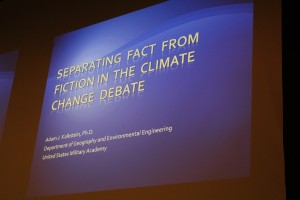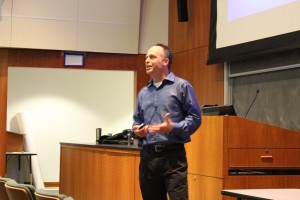On April 6th, the In structional Media Services Center had the pleasure of recording Professor Michael Boms and guest speaker Adam Kalkstein in their talk about climate change and its concerns. While Professor Boms opened up the talk by stating politicians are aware of these climate change issues, but ignoring them for the profit fossil fuel deals bring them, Kalkstein sought to focus more on the science of the issue at hand. The media often distracts from the real facts as it creates hoaxes or exaggerates the circumstances for more viewers, and Kalkstein warns that if the covers of magazines display an emotionally provoking picture of animals, it should raise a red flag. He continued his speech to say it’s hard to blame one event on or for climate change, and it is an accumulation of various problems. A majority of scientists today will agree that global warming is occurring. The discrepancy occurs when it comes to answering why it is happening. It is clear that oceans are warming, plants are budding earlier, and animal migrations are happening sooner than in the past. The warming is a result of the rise in carbon dioxide levels, which prevents heat from escapin
structional Media Services Center had the pleasure of recording Professor Michael Boms and guest speaker Adam Kalkstein in their talk about climate change and its concerns. While Professor Boms opened up the talk by stating politicians are aware of these climate change issues, but ignoring them for the profit fossil fuel deals bring them, Kalkstein sought to focus more on the science of the issue at hand. The media often distracts from the real facts as it creates hoaxes or exaggerates the circumstances for more viewers, and Kalkstein warns that if the covers of magazines display an emotionally provoking picture of animals, it should raise a red flag. He continued his speech to say it’s hard to blame one event on or for climate change, and it is an accumulation of various problems. A majority of scientists today will agree that global warming is occurring. The discrepancy occurs when it comes to answering why it is happening. It is clear that oceans are warming, plants are budding earlier, and animal migrations are happening sooner than in the past. The warming is a result of the rise in carbon dioxide levels, which prevents heat from escapin g the atmosphere, called the greenhouse effect. The greenhouse effect is natural, but its increase due to global warming is concerning. Scientists today are very confident this is due to human activities. Kalkstein proceeded to discount myths and assert factually based conclusions. Hurricanes are not expected to increase in numbers, but increase in intensity. Tornadoes are definitely on the rise, but this may be due to the fact that there are more humans spread across the land, and therefore storms that would have gone unnoticed in the past are now being reported. There is more rain, which causes more flooding because warm air holds more water. Kalkstein claims there is a definite climate change link here, which can be pointed at the spread of construction, leaving less ground to absorb water. In addition, drought and sea levels have increased, which would be detrimental to the coasts. Ocean acidification is also on the rise, putting sea life and coral reefs in danger. Kalkstein attempted to end on a positive note by stating if there is a global movement to reverse these effects there is hope, and we can all contribute by carpooling or utilizing renewable energy sources. This and other talks can be found for viewing on the IMS website at www.newpaltz.edu/ims.
g the atmosphere, called the greenhouse effect. The greenhouse effect is natural, but its increase due to global warming is concerning. Scientists today are very confident this is due to human activities. Kalkstein proceeded to discount myths and assert factually based conclusions. Hurricanes are not expected to increase in numbers, but increase in intensity. Tornadoes are definitely on the rise, but this may be due to the fact that there are more humans spread across the land, and therefore storms that would have gone unnoticed in the past are now being reported. There is more rain, which causes more flooding because warm air holds more water. Kalkstein claims there is a definite climate change link here, which can be pointed at the spread of construction, leaving less ground to absorb water. In addition, drought and sea levels have increased, which would be detrimental to the coasts. Ocean acidification is also on the rise, putting sea life and coral reefs in danger. Kalkstein attempted to end on a positive note by stating if there is a global movement to reverse these effects there is hope, and we can all contribute by carpooling or utilizing renewable energy sources. This and other talks can be found for viewing on the IMS website at www.newpaltz.edu/ims.
© 2024 INSTRUCTIONAL MEDIA SERVICES
Theme by Anders Noren — Up ↑

Leave a Reply